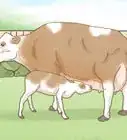This article was co-authored by Karin Lindquist. Karin Lindquist earned a BSc in Agriculture as an Animal Science major from the University of Alberta, Canada. She has over 20 years of experience working with cattle and crops. She's worked for a mixed-practice veterinarian, as a sales representative in a farm supply store, and as a research assistant doing rangeland, soil, and crop research. She currently works as a forage and beef agriculture extension specialist, advising farmers on a variety of issues relating to their cattle and the forages they grow and harvest.
This article has been viewed 69,867 times.
Brangus cattle are a mix of Angus and Brahman cattle. Breeding these two types of cows together began around the 1930s in the USA. To be considered Brangus, a cow must have 3/8 Brahman and 5/8 Angus genetics.[1] While the term 'Brangus cattle' typically refers to black cows, Red Brangus also exist.
Steps
Identifying Physical Characteristics
-
1Identify coloration. Angus cows and Brahman cows produce two colors of Brangus cows, black or red. While each color has similar genetic origins, there are different breed associations for Black Brangus cattle and Red Brangus.
-
2Examine body type. Brangus cattle have a sleek coat and pigmented skin. Their skin is loose, and they exhibit neck folds. Brangus cattle have a slightly round rump. Bulls have a moderate hump. Their overall build is sturdy.Advertisement
-
3Examine head characteristics. Brangus cows have medium to large ears. They are also naturally polled, or horn-less. There are otherwise no distinct facial characteristics to Brangus cows.
Identifying Breed Characteristics
-
1Examine DNA testing. Brangus cows are tested through the breeding association to determine appropriate genetic distribution. To qualify as Brangus, the cow must exhibit 3/8 Brahman and 5/8 Angus genetics.
-
2Note Brangus maturity and breeding. Bulls mature by two years and can start breeding by 18 months. Heifers are ready to breed by 14 months of age. The bulls can breed through age 12, while the females can produce calves beyond the age of 14.[2]
-
3Note weight and physical development. Calves gain weight quickly and are born about medium size. Mature Brangus bulls generally weigh between 1,800 and 2,000 pounds. Mature females weigh around 1,100 to 1,200 pounds.[3]
-
4Observe weather tolerance. This breed is noted for its resistance to heat and high humidity as well as cold environments. Brangus cows can withstand changing seasons and are found in different parts of the world, such as the USA, Canada, Mexico, Argentina, and Australia.[4]
-
5Note positive parent traits. Brahman cows were bred to exhibit disease resistance, hardiness, and strong maternal instincts. Angus cows are known for their superior carcass qualities and strong females, who exhibit superior fertility and milking ability.[5] Together, the Brangus breed capitalizes on both cows' positive breeds.
-
6Note the unique Brangus traits. Brangus cows are known to be docile and to have strong maternal instincts toward their young. They exhibit moderate to late-maturing and gain weight quickly. They are hardy and exhibit strong parasite resistance.[6]
Community Q&A
-
QuestionWhat price will a non-registered Brangus cow bring vs. a registered Brangus cow?
 Community AnswerThe price you get depends on how you're arranging the sale. If you're selling directly to another producer, a registered Brangus cow will a bring a higher sale price, but if you are selling through a sale-barn there will be no difference in price between registered and non-registered.
Community AnswerThe price you get depends on how you're arranging the sale. If you're selling directly to another producer, a registered Brangus cow will a bring a higher sale price, but if you are selling through a sale-barn there will be no difference in price between registered and non-registered. -
QuestionWhere do Brangus cattle originate? How did they get introduced into the U.S?
 Community AnswerThe Brangus breed originated in North America. It was created by mixing Brahman cattle (also an American-developed breed that has its roots in Indian breeds Kankrej, Gir, and Ongole) with Angus. It was developed by the USDA at the USDA research station in Jeanerette, Louisiana, as well as other ranches in Oklahoma, Mississippi, Texas and Canada in the 1930s. Further development of the breed was done in Australia in the 1950s and '60s, but the breed's roots are American.
Community AnswerThe Brangus breed originated in North America. It was created by mixing Brahman cattle (also an American-developed breed that has its roots in Indian breeds Kankrej, Gir, and Ongole) with Angus. It was developed by the USDA at the USDA research station in Jeanerette, Louisiana, as well as other ranches in Oklahoma, Mississippi, Texas and Canada in the 1930s. Further development of the breed was done in Australia in the 1950s and '60s, but the breed's roots are American. -
QuestionHow long is a Brangus cow?
 Community AnswerFrom head to tail, Brangus cattle average 6 to 7 feet long.
Community AnswerFrom head to tail, Brangus cattle average 6 to 7 feet long.
References
- ↑ http://www.ansi.okstate.edu/breeds/cattle/brangus
- ↑ http://www.thebeefsite.com/breeds/beef/43/brangus/
- ↑ http://www.thebeefsite.com/breeds/beef/43/brangus/
- ↑ http://www.ansi.okstate.edu/breeds/cattle/brangus
- ↑ http://www.ansi.okstate.edu/breeds/cattle/brangus
- ↑ http://www.ansi.okstate.edu/breeds/cattle/brangus
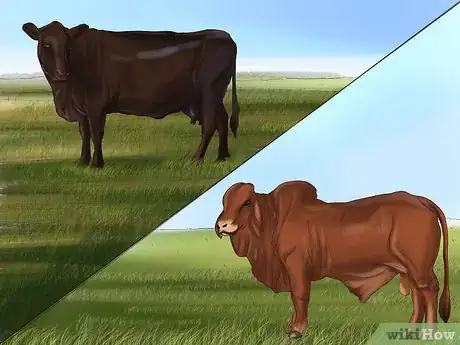
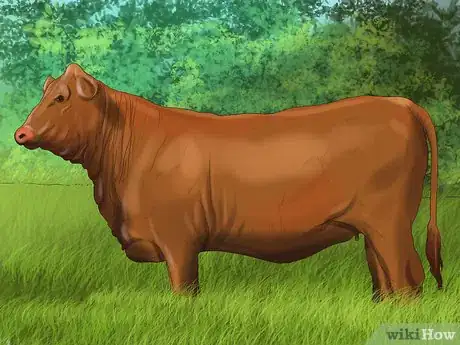
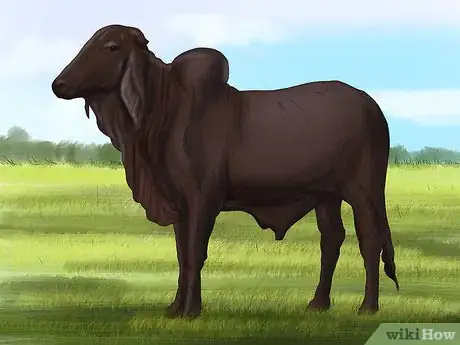
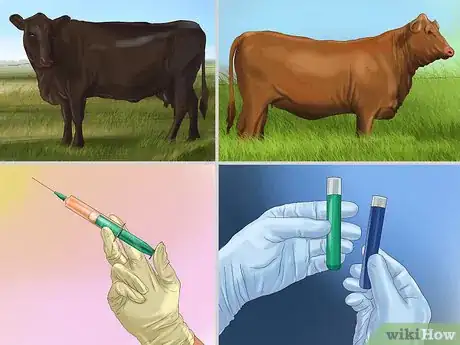
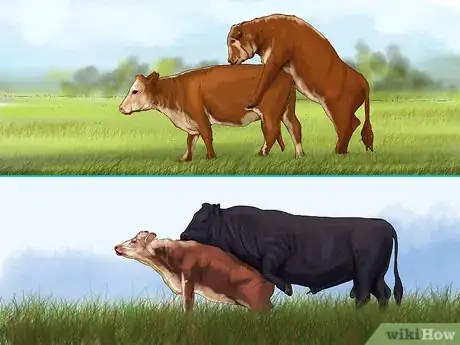
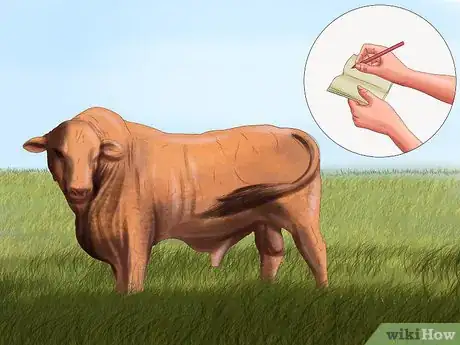
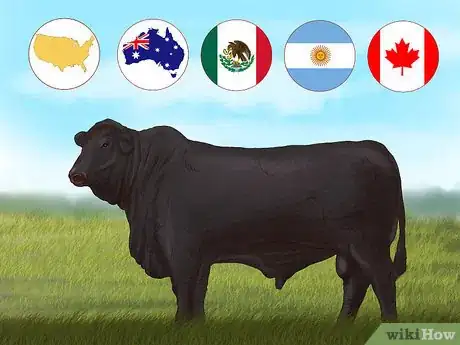
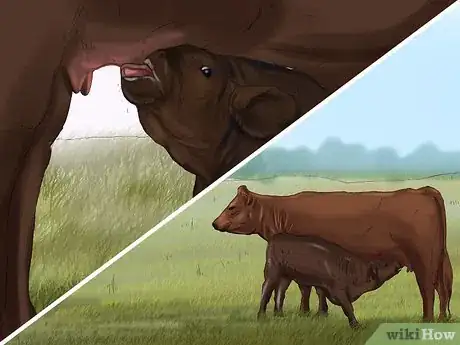
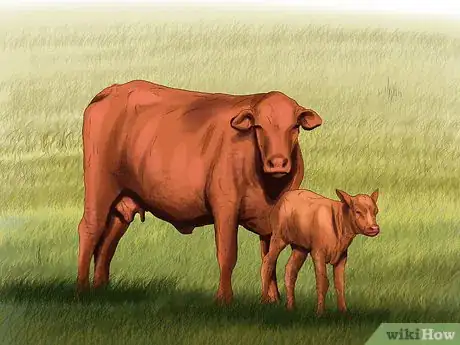
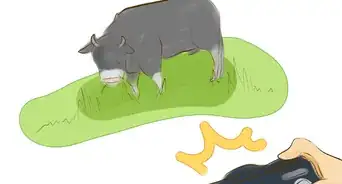

-in-Cattle-Step-6.webp)
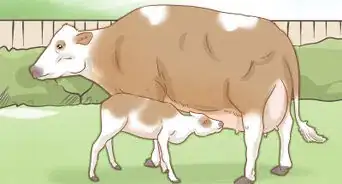
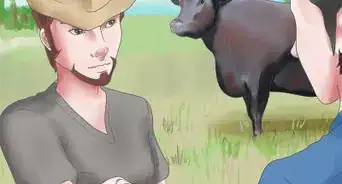
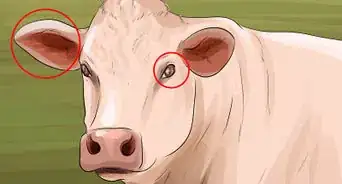
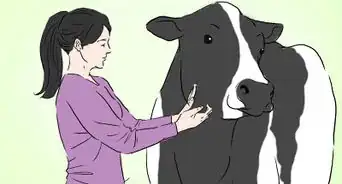
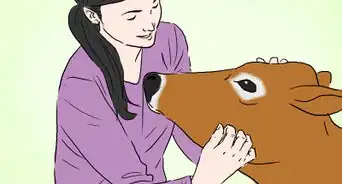
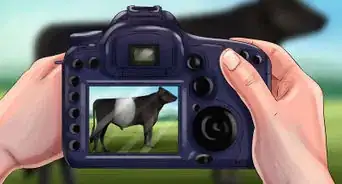








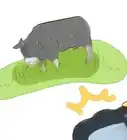

-in-Cattle-Step-6.webp)
